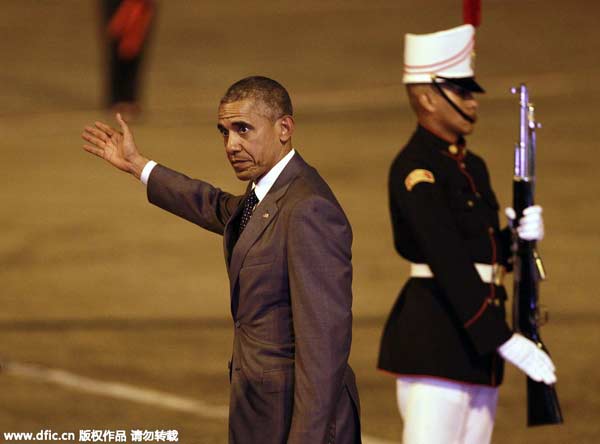Historic encounter with Cuba's Castro awaits Obama in Panama
(Agencies) Updated: 2015-04-10 10:38
 |
|
US President Barack Obama gestures as he arrives at the International Tocumen Airport in Panama City, Panama, April 9, 2015. [Photo/IC] |
PANAMA CITY - Turning the page on a half-century of hostility, President Barack Obama signaled Thursday he will soon remove Cuba from the US list of state sponsors of terrorism, boosting hopes for improved ties as he prepared for a historic encounter with Cuban President Raul Castro.
Hours before his arrival in Panama for a regional summit, Obama said the US State Department had finished its review of Cuba's presence on the list, a stain on the island nation's pride and a major stumbling block for efforts to mend US-Cuba ties. A top senator confirmed that the agency had recommended removing Cuba from the list, all but ensuring action by the president within days.
"We don't want to be imprisoned by the past," Obama said during a visit to Kingston, Jamaica. "When something doesn't work for 50 years, you don't just keep on doing it. You try something new."
With his optimistic assessment, Obama sought to set the tone for the US and Cuba to come closer to closing the book on more than a half-century of estrangement, when he and Castro come face to face at the Summit of the Americas. Obama arrived Thursday evening in Panama City.
The highly anticipated interaction with Castro will test the power of personal diplomacy as the two leaders attempt to move past the sticking points that have interfered with their attempt to relaunch diplomatic relations.
Sen. Ben Cardin of Maryland, the top Democrat on the Senate's foreign relations panel, called the recommendation to delist Cuba an important step toward forging a more productive US-Cuba relationship. "The United States has a unique opportunity to begin a fresh chapter with Cuba - one that advances our national interests on the island and in the hemisphere," he said.
This year's summit is the first to include Cuba, and for Castro it's a powerful opportunity to prove his country can be a responsible player on the world stage. Obama arrives having amassed some goodwill in Latin America by upending the US policy of isolating Cuba, a policy that had irritated others in the region, and by loosening immigration policies at home.
How much face time Obama and Castro will have at the summit was unclear. Although no formal meetings were scheduled, the White House said the two would surely cross paths.
Obama and Castro shared a handshake in 2013 at Nelson Mandela's funeral, a jarring image for those who still recall the levels of US-Cuban antipathy during the Cold War.
While in Panama, Obama was to meet Friday with Panamanian President Juan Carlos Varela and other Central American leaders. He planned to speak at a forum of CEOs before joining other leaders for dinner at Panama Viejo, home to archaeological ruins dating to the 1500s. A visit to the Panama Canal was also likely.
Although taking Cuba off the terror list would remove one major obstacle to warming relations, Obama acknowledged that progress hasn't been as swift as some had hoped.
"They are proceeding as I expected," Obama said of the talks between Havana and Washington. "I never foresaw that immediately, overnight, everything would transform itself."
The wild card at the summit: Venezuela's leftist President Nicolas Maduro. Obama's recent move to slap sanctions on seven leading Venezuelan figures seemed to backfire when other Latin leaders denounced it as overkill and rallied to Maduro's side. Maduro had said he plans to hand Obama documents with millions of signatures denouncing US aggression.






